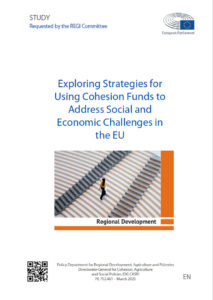
This study investigates how Cohesion Policy and its main instruments—the European Regional Development Fund (ERDF) and the European Social Fund+ (ESF+)—can better respond to today’s pressing social and economic challenges across the European Union.
Europe faces a series of structural and emerging issues, including demographic change, migration, digital transformation, and economic crises. These dynamics test the capacity of EU funding mechanisms to support inclusive and sustainable regional development. The project aims to assess how Cohesion Funds are currently used across regions, where gaps remain, and how funding instruments can be adapted to ensure greater flexibility, resilience, and impact in the face of unforeseen challenges.
The research adopts a multi-method approach, combining:
Desk research and critical review of literature and policy documents
Statistical and correlation analysis to link socio-economic challenges, interventions, and regional outcomes
Stakeholder interviews with policymakers and practitioners
Regional case studies from diverse EU territories, highlighting best practices and implementation gaps
By evaluating Cohesion Policy performance in the 2014–2020 and 2021–2027 programming periods, the study offers evidence-based recommendations on how future EU funds can be mobilised more effectively to address inequalities, foster growth, and strengthen social cohesion.
Cover image generated with Google AI Studio. The illustration is for visual and illustrative purposes only and does not depict actual project data or outcomes.